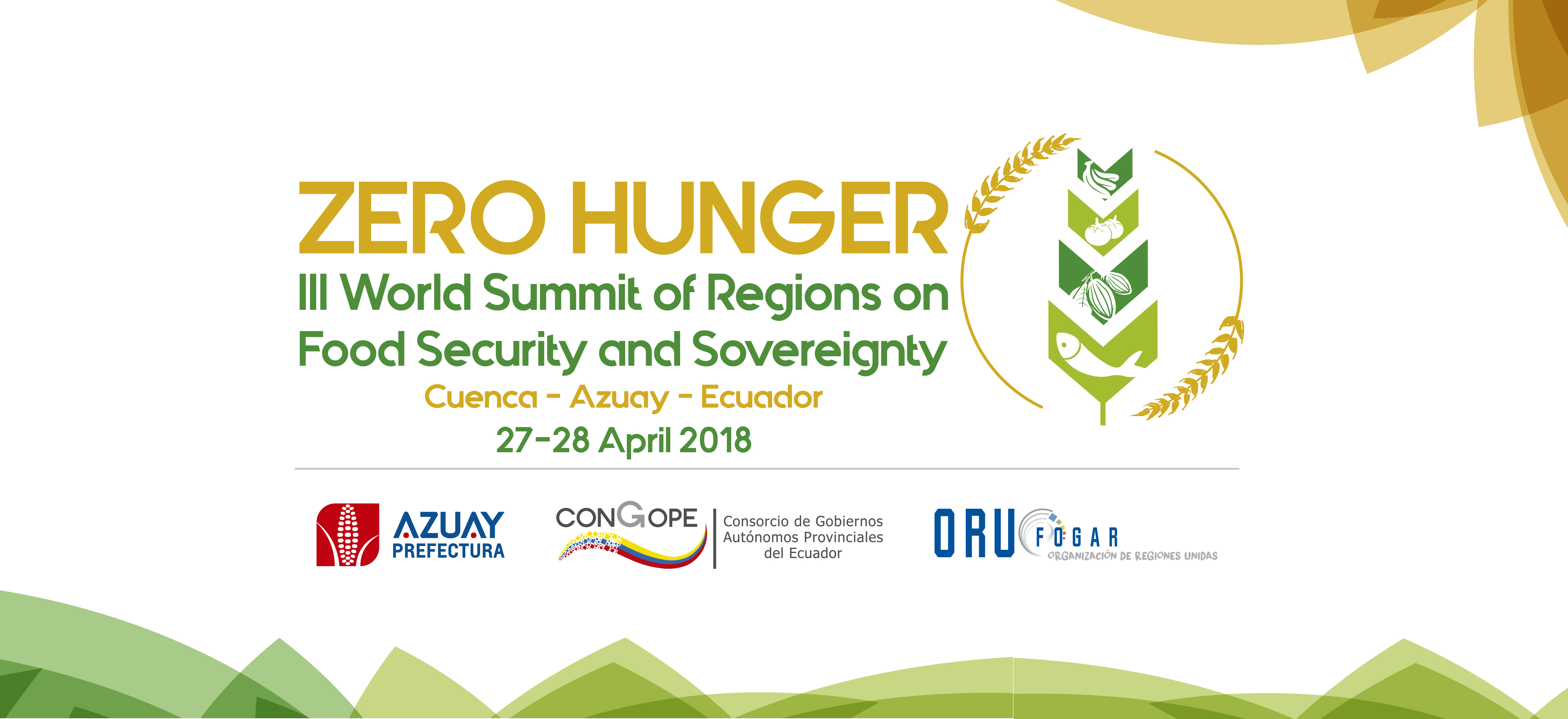“Hunger Zero”, III World Summit in Cuenca, Ecuador

Paúl Carrasco Carpio
Prefet of Azuay
As the Provincial Prefect of the Province of Azuay; whose capital is Cuenca a city declared in 1999 as Cultural Heritage of Humanity and being part of the host team of one of the most important event, at a global level, to be held in our country, Ecuador, I hope that those of us who are responsible of the organization respond with warmth and quality to the expectations that the Third World Summit “HUNGER ZERO” awakens in those attending it and, why not, in the peoples of the Earth because the subject to be addressed in it directly concerns all the inhabitants of our planet.
It is acknowledged that Zero Hunger is the second of the 17 Sustainable Development Goals (SDGs) of the United Nations, which are the result of a historic agreement reached in September 2015 by 193 world leaders. Unlike the Millennium Development Goals (MDGs), which were developed by a group of experts and that set only 21 goals, the SDGs represent an improvement because they are the result of a negotiation process involving 193 member states of the UN. And, what is more important, it had an unprecedented participation of civil society which meant a broader representation and as a consequence the range of perspectives and interests also had a more global character. That is why, they were 169 the proposed goals.
Although Zero Hunger is only one of a range of objectives, it constitutes a basic link in the chain of interconnected elements that represent the SDGs. Therefore, delineating its approach makes sense to the extent that the expectations raised in the MDGs, within this field, did not present encouraging results. On the contrary, they showed setbacks especially in certain regions of the planet considered endemic due to their scarce economic growth, social inclusion and protection of the environment.
Despite the fact that in the SDGs, in addition to developing countries, rich countries are also involved which would mean a greater global commitment to social issues related to hunger and malnutrition. Data shared by FAO in 2017 shows that the population that suffers hunger in the world reaches 11% higher than the 10.6% of the year 2015. This would mean that currently 815 million human beings suffer from hunger. Obviously, in this increase should be considered unpredictable factors of recent incidence such as armed conflicts or the effects of climate change, which have reduced production capacities in certain countries or areas of the planet. The truth is that 6 out of 10 people who suffer from hunger come from these regions. If these are the conditions, the Zero Hunger, which was raised as a fight that should be won before 2030, could constitute an illusion. But the only battles that are lost are those that are not fought, so we believe that the challenge is there, present and feasible only if all the leaders of the planet and civil society organizations make the best efforts to comply with the proposed goals.
The mere fact of considering that the planet produces enough to feed the entire world population gives us the certainty that the problem is not in the lack of prodigality of the Pacha Mama (as our ancestral peoples call Mother Earth). The causes, unfortunately, will always be found in the unfair and inequitable distribution of wealth and in the persistence of inexplicably large gaps between rich and poor either in the relationship between states or within them.
The low productions, the faulty markets, the inaccessible prices, the lack of technical assistance, the inability to access nutritious and healthy food, etc., are but the effects of an unjust reality to which we are called to face it. Hence the importance of the III World Summit on Food Security and Sovereignty; which will be held in the city of Cuenca the 27th to the 28th of April of this year, specifically to address the second objective of the SDGs: Zero Hunger. From which we are sure will obtain important teachings to be learned as a product of specific experiences based on proposals that can be developed to promote programs and actions, at the national and local level, that could affect the change of this reality and generate an unshakeable political will and a long-term collective effort to end hunger and malnutrition on the planet.
We have faith that, as a result of the hard work of those attending this Third Summit, the "Declaration of Cuenca" is the way to assume the commitments that allow us to promote through the regions of the world, local governments, higher education centers, social organizations and civil society, the actions that humanity demands to eliminate once and for all hunger and malnutrition and achieve the long-awaited security and food sovereignty.








































































